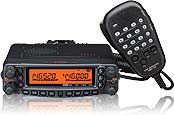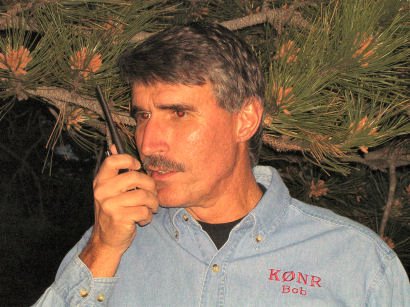Richard Garriott W5KWQ in Space
 Richard Garriott, W5KWQ is on his way to the International Space Station (ISS) as the sixth "space tourist" riding on a Soyuz spacecraft. This would be just another rich guy buys a ride into space story, except that Richard is a ham radio operator, a successful technogeek and the son of a famous astronaut.
Richard Garriott, W5KWQ is on his way to the International Space Station (ISS) as the sixth "space tourist" riding on a Soyuz spacecraft. This would be just another rich guy buys a ride into space story, except that Richard is a ham radio operator, a successful technogeek and the son of a famous astronaut.For me, the story starts back in November of 1983 when the Space Shuttle mission STS-9 included an astronaut named Owen Garriott, who is a radio amateur (W5LFL). This was the first flight that had SAREX (Space Amateur Radio Experiment) on board, which was a modified commercial VHF FM handheld radio set for the 2-Meter ham band. Everyone was listening for the first ham radio transmissions from space, myself included. I was living in the greater Seattle area at the time and I happened to hear the first transmission between W5LFL on the Shuttle Columbia and WA1JXN in Montana. Columbia was coming in over the Pacific Ocean and I could hear W5LFL very clearly. So clearly, I wondered if it was really him (or could some local guy on 2M FM be messing with us.) In retrospect, I should have known....after all, a transmission from the shuttle overhead is a slam-dunk, line-of-sight piece of cake QSO on 2 Meters. AA5TB has made a few audio recordings of W5LFL radio transmissions available on the web.
Owen Garriott's son Richard wanted to follow in his dad's footsteps as an astronaut, but found out as a kid that his eyesight would keep him out of the astronaut corps. There is a great article in Wired magazine that gives the background on Richard's journey into space. (If you are interested in this story at all, the Wired article is a must read.) Richard has his own RichardInSpace website that is also interesting. So instead of being an astronaut, he ends up writing computer gaming software and makes millions of dollars. (Apparently, Richard is famous in the computer gaming world.) Not a bad tradeoff, I suppose, as he is now able to pay for the ride up to the ISS.
While the ARRL announcement tells about the ham radio side of the story, the mainstream media has picked up on the "son follows father into space" story, sometimes with a mention of ham radio. Richard plans to transmit pictures from space using Slow-Scan Television (SSTV). The ARISS (Amateur Radio aboard International Space Station) sent out this announcement:
The ARISS team received word from ARISS Russia delegate Sergey Samburov,You should be able to receive these photos yourself by using an FM receiver on 145.80 MHz, a PC with soundcard and the MMSSTV software. Oh, the ISS needs to be within radio range, which means you need to figure out how to track it in real time. Or just go to this NASA website. The ARISS team has established a blog for providing updates on the SSTV operation and a web page for sharing of SSTV photos from around the world.
RV3DR, that the current ISS crew expect to transmit SSTV on October 12 from
18:00-21:00 UTC. This is your opportunity to test out your SSTV reception
capability and to post images on the ARISS SSTV Gallery. The planned
downlink for this operation will be 145.80 MHz with Robot 36 as the expected
SSTV mode of operation.
Just so it doesn't get missed: there is another radio amateur on board, Mike Fincke (KE5AIT). Some web pages to watch for current information include http://www.ariss.org/, http://www.amsat.org/, http://www.arrl.org/ and http://www.issfanclub.com/ .
All of this is very interesting to me, taking me back to 1983. Then, I realize that was 25 years ago. Is the space shuttle really that old? Afraid so.
73, Bob K0NR







